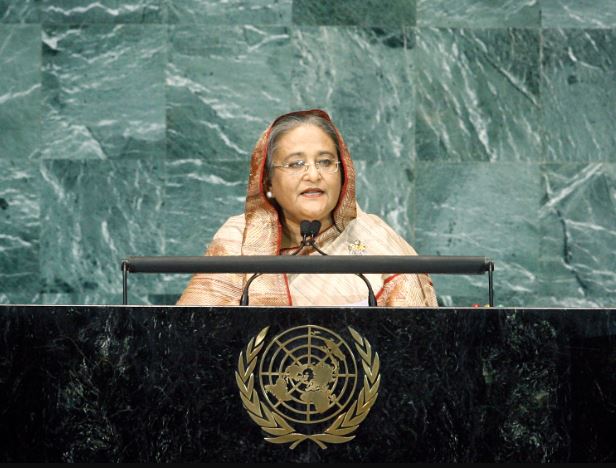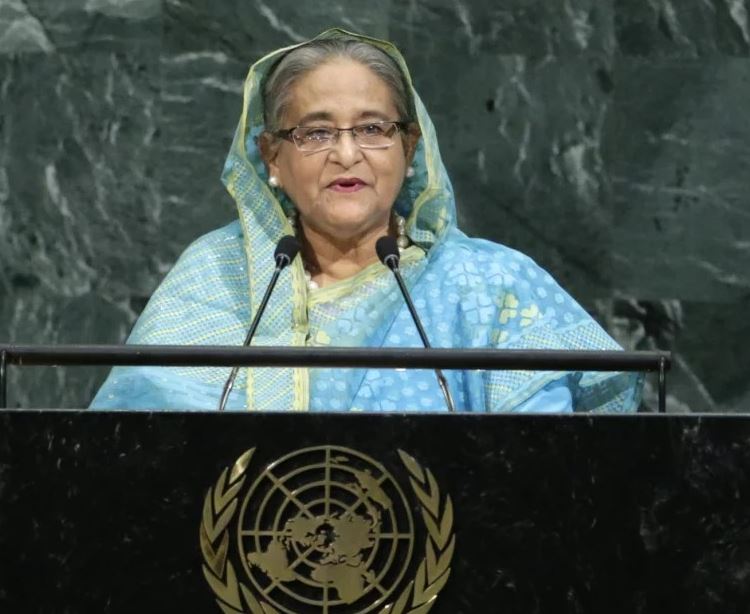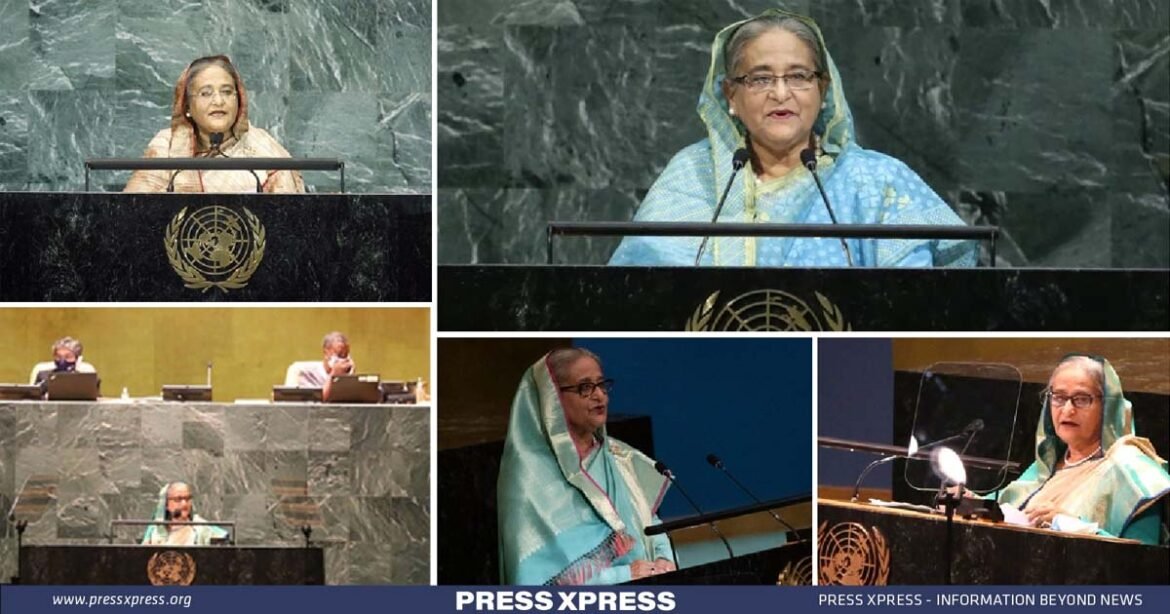On September 25, 1974, Bangabandhu Sheikh Mujibur Rahman, the Father of the Nation of Bangladesh, achieved a historic milestone by delivering the very first Bengali speech at the 29th United Nations General Assembly (UNGA). During his extraordinary address, he declared, “Nations that have secured their freedom through years of hardship and sacrifice possess unwavering determination and resilience. Mr. President, my fellow Bengalis can endure suffering, but they will not die. In the challenge to survive, the will of my people is my greatest strength.”

It was 22 years after that momentous occasion when Prime Minister Sheikh Hasina, daughter of the Father of the Nation Bangabandhu Sheikh Mujibur Rahman addressed the UN General Assembly in Bengali in 1996.
You Can Also Read: PM Hasina Honored for ‘Community Clinic Model’ in New York
The Prime Minister is presently in New York, USA, for the 78th United Nations General Assembly session. Since arriving, she has delivered speeches at two high-level conferences and participated in an evening dinner event. Additionally, she is scheduled to take part in the high-level general discussion on the opening day of the session, held at the UN Headquarters in the General Assembly Hall.
Today’s discussion Focuses on the Prime Minister’s United Nations Representation Spanning from 1996 to the Present.
Sheikh Hasina’s representation in the UN
1996-2001
Bangladesh has been represented by its heads of state and government at the General Assembly, as documented in UN archives. During her tenure as prime minister from 1996 to 2001, Sheikh Hasina delivered three speeches in Bengali at the General Assembly.
Reviewing her speeches, it becomes evident that Prime Minister Sheikh Hasina has voiced a two-fold agenda. On one hand, she has championed the cause of global peace, security, and stability, while on the other, she has passionately advocated for the eradication of economic inequalities between developed and developing nations to foster worldwide development.In summary, she has called for a world without hunger and the looming threat of nuclear weapons, urging the United Nations to adopt more effective, pragmatic, and suitable measures to advance these ideals.
2009

2010
The 65th session of the UNGA took place in New York, on 25 September 2010. Prime Minister described Bangladesh as a secular and progressive nation that is committed to fulfilling the promises of democracy, good governance, human rights, and the rule of law made by its founding leader, Bangabandhu Sheikh Mujibur Rahman.The speaker emphasizes the importance of justice in addressing past wrongs.

The speech recalls acts of terrorism in Bangladesh, including the assassination of Bangabandhu Sheikh Mujibur Rahman in 1975 and subsequent assassination attempts on the speaker. It highlights the suffering caused by terrorism, particularly during the period when the Awami League was in opposition from 2001 to 2006.The government was working toward a “Digital Bangladesh” and aimed to transform it into a middle-income country by 2021.
2013

2014
2014 celebrated forty years of Bangladesh’s membership in the UN. The prime minister in her speech said: “As we gather here today for this special event, I reiterate the aspirations of our people, recalling the timeless message delivered by our beloved Father of the Nation, Bangabandhu Sheikh MujiburRahman, to this distinguished Assembly in 1974: Let us unite in our pursuit to build a world devoid of poverty, hunger, warfare, and human suffering, and instead, usher in an era of global peace and security for the betterment of all humanity.”
2017
In her 14th address to the UN General Assembly, the speaker expressed her concern over the plight of the Rohingya refugees from Myanmar in Cox’s Bazar, Bangladesh. She empathized with them, drawing on her own experience as a refugee after her family’s assassination in 1975. She called for immediate action to address the crisis, including stopping the violence in Myanmar, sending a Fact-Finding Mission, creating safe zones, ensuring the safe return of Rohingya refugees, and implementing the Kofi Annan Commission Report.

The speaker also highlighted Bangladesh’s commitment to peace, emphasizing its role in tabling resolutions on the “Culture of Peace” and supporting the Middle East Peace Process. Bangladesh pledged $100,000 to the UN Peacebuilding Fund and promised to maintain its commitment to UN peacekeeping operations while addressing allegations of sexual exploitation and abuse.
2018
At the 73rd UNGA, the speaker discussed women’s empowerment and gender equality, with achievements in women’s education and political representation highlighted. The speaker discusses healthcare improvements, including efforts to combat tuberculosis and raise awareness about neuro-developmental disorders. They mention Bangladesh’s advancements in digital technology and space exploration.
Climate change is a significant concern for Bangladesh, and they are committed to addressing its impacts through various initiatives and long-term planning. The speaker also addressed the issue of Palestine and called for an end to rights violations.
2019

2021
In this address, the speaker acknowledges the special significance of the year, which marks Bangladesh’s golden jubilee of independence and the birth centenary of the Father of the Nation, Bangabandhu Sheikh Mujibur Rahman. Regarding the COVID-19 pandemic, the speaker credits Bangladesh’s healthcare system and multi-stakeholder approach for mitigating its impact. They stress the need for equitable vaccine access globally and urge the transfer of vaccine technologies.The speaker envisions a peaceful South Asia and expresses readiness to work with the people of Afghanistan for their socio-economic development.

A sneak peek of what’s on the horizon in 2023
- Sheikh Hasina left for New York to attend the 78thUNGA session on September 17, 2023.
- Sheikh Hasina delivered a keynote speech at a UNIDO and Deloitte conference on September 18.
- She addressed the SDG Summit – Leaders’ Dialogue 4 on the same day.
- The premier attended a private dinner marking the UN’s 2023 SDGs Summit on the evening of September 18.
- She attended the high-level General Debate of the 78th UNGA session on September 19.
- US President Joe Biden on September 19 invited Sheikh Hasina to a dinner party.
- The prime minister participated in various high-level side events, including discussions on Rohingya and climate change, Sustainable Development Goals (SDGs), universal health, and finance.
- Sheikh Hasina participated in a High-level Debate on Financing for Development (FfD) and the Secretary General’s Climate Ambition Summit on 20th September.
- On the same day, she attended a High-Level Meeting on Pandemic Prevention, Preparedness, and Response and the Annual Meeting of the UNGA Platform of Women Leaders.
- She took part in a High-Level side event on the Rohingya Crisis, a Breakfast Summit on addressing sea-level rise, and a High-Level Meeting on Universal Health Coverage, the next day.
Bangladesh’s journey at the United Nations General Assembly (UNGA) has been deeply intertwined with the legacy of its founding leader, Bangabandhu Sheikh Mujibur Rahman, who delivered the first Bengali speech at the UNGA in 1974. Prime Minister Sheikh Hasina, the daughter of Bangabandhu, has continued this tradition of representation.
Over the years, Prime Minister Sheikh Hasina’s speeches at the UNGA have reflected a multifaceted agenda. She has tirelessly advocated for global peace, security, and stability while simultaneously championing the cause of reducing economic disparities between developed and developing nations to promote global development.

Her addresses have touched upon various critical issues, including justice for past wrongs, counterterrorism efforts, economic transformation, women’s empowerment, healthcare improvements, climate change mitigation, and humanitarian crises like the Rohingya refugee situation. These speeches have showcased Bangladesh’s commitment to international cooperation and the betterment of all humanity.
As we look ahead to 2023, Sheikh Hasina’s continued presence at the UNGA reaffirms Bangladesh’s commitment to addressing pressing global challenges. Her participation in a wide range of high-level events during this session reflects the nation’s proactive engagement in finding solutions to contemporary issues, from climate change to pandemic prevention, universal health coverage, and sustainable development.
Bangladesh’s journey at the UNGA is a testament to its dedication to global peace, progress, and solidarity, echoing the visionary ideals of its founding leader and the indomitable spirit of its people.


